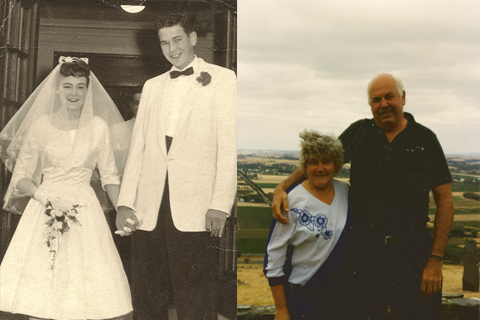Jim (CBUS 1976): I dropped out of high school in 1947 when I was 15. I wanted to be an accountant but my parents couldn’t afford for me to be in school – I was from a family of eight kids, and my dad had hardly any jobs through the Depression. I worked factory jobs for a few years, and then went to work in the post office. Sheila trained as a nurse in Edinburgh, Scotland, and then came over here in 1959. I met her at a screening of Ben-Hur in 1960. I found her cheeky and very much a feminist. Smart, too. We met in March and got married in October, and we’ve been married 53 years now. We love to travel together, and we’ve been around the world a couple of times, visiting Vancouver, Hawaii, Fiji, Australia, Singapore, Thailand and then England. I have no idea why she puts up with me, but I guess we were just compatible from the start. I just figured that if I was ever going to marry anyone, it would be Sheila – I never felt this way about any of the other girls I went with.
Sheila (CPHN 1965, BScN 1975, MEd 1984): I was from a working class family of four kids. My dad was a barber and my mum stayed at home, and we were quite poor. I started going to night classes for nursing and then I moved to Canada and finished my initial nursing education at U of T. Jim and I have both worked full time all our lives. When we both went back to school part time in our thirties – Jim for business administration and me for nursing – we really supported each other. We went to school together, just like we did a lot of things together, and Jim would pick me up after class. I think we’ve been together for over 50 years because we each let the other go their own way – within reason. We’re tolerant of each other’s foibles. When I do something impossible, he just shrugs his shoulders. And now, after all these years, we rarely make a move without each other.
Recent Posts
People Worry That AI Will Replace Workers. But It Could Make Some More Productive
These scholars say artificial intelligence could help reduce income inequality
A Sentinel for Global Health
AI is promising a better – and faster – way to monitor the world for emerging medical threats
The Age of Deception
AI is generating a disinformation arms race. The window to stop it may be closing





